English Edition

- By CNI
- Category: English Section
- Hits: 292
CNI News
17 January 2026
The National Socialist Council of Nagaland–Khaplang/Yung Aung (NSCN-K/YA) alleged on January 14, 2026, that the National Socialist Council of Nagaland–Khaplang/Angmai (NSCN-K/AM) received military equipent and financial assistance from the Indian government in order to gain control of the Pansaung area, which has an outlet on the India–Myanmar border.
Pansaung is located in Nanyun Township, Naga Self-Administered Zone, Sagaing Region, and is the only border trade gateway between the Naga area and India. In addition to NSCN-K/AM, other groups such as NSCN-K/YA, the Kachin Independence Army (KIA), and the Eastern Naga National Organization/Army (ENNO/ENDA) are also striving to control the area.
NSCN-K/AM entered Pansaung town on January 1, 2026, deployed troops, and carried out security operations. On January 9, NSCN-K/YA launched an attack, resulting in the deaths of two NSCN-K/AM members and injuries to one.
In retaliation, NSCN-K/AM attacked and seized an NSCN-K/YA camp located between Takar Village and Namphar Village (18-mile gate) in Nanyun Township on January 12, 2026.
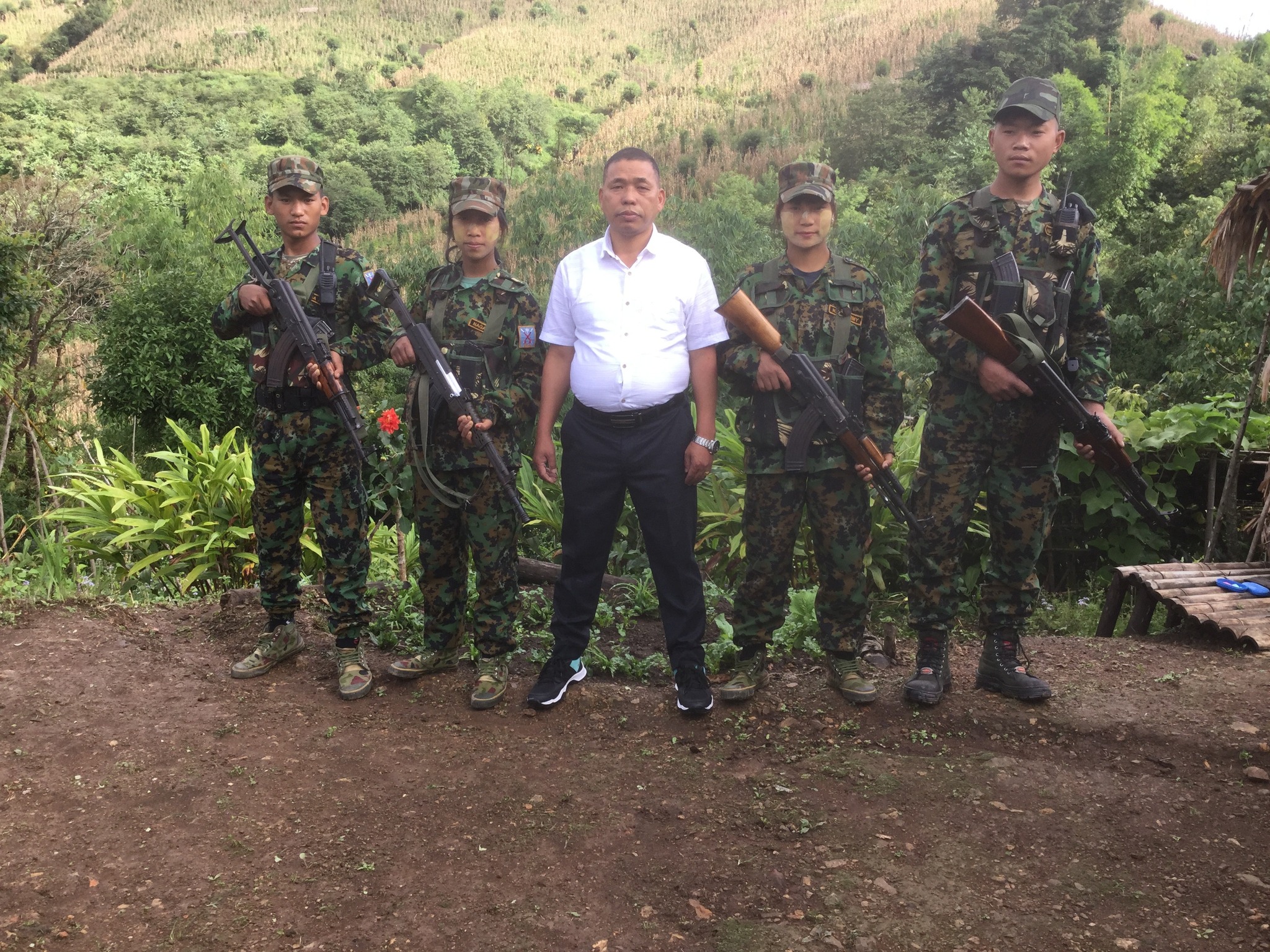
NSCN-K/AM members
NSCN-K/YA further claimed that, acting under the directives of Indian agencies, NSCN-K/AM incited violence in Eastern Nagaland, once again disregarding the Naga people’s desire for peace. It accused the group of being merely a proxy of Indian intelligence, according to a statement released on January 14, 2026.
NSCN-K/YA stated:
“Indian agencies show understanding toward this group (NSCN-K/AM) because the presence of the Angmai faction is viewed as a secondary force to weaken and suppress NSCN-K/YA and its fighting capacity. The Angmai group received military equipment and financial assistance from Indian authorities to counter NSCN-K/YA in the Pansaung area.”
The NSCN-K/YA statement also said that Mr. Angmai and Mr. Mulatonu must correct their irrational actions and should not align themselves with a country like India.
NSCN-K/AM has held peace talks with the governments of Myanmar and India regarding regional stability and peace during 2024–2025.
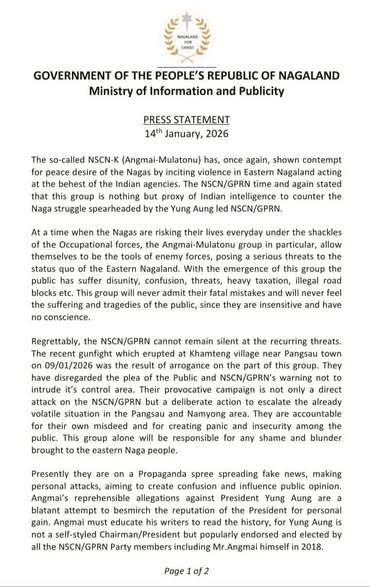
NSCN-K/YA statement
NSCN-K/YA, meanwhile, has frequently carried out ambush attacks against the Indian military in Arunachal Pradesh State.
India previously conducted a drone strike on NSCN-K/YA camps operating along the Arunachal Pradesh–Myanmar border on the afternoon of October 20, 2025, killing five people.

- By CNI
- Category: English Section
- Hits: 188
CNI News
January 16, 2026
Minister U Ko Ko Hlaing, representing the Myanmar delegation, argued at the International Court of Justice (ICJ) that accusing counter-terrorism operations against violent attacks of being "genocide" is a baseless allegation.
Minister U Ko Ko Hlaing presented this defense on behalf of the Myanmar delegation at the ICJ on January 16, 2026.
He testified that Myanmar complies with international agreements and regulations. He further argued that the genocide allegations are groundless, asserting that no genocide was committed and that the actions taken were merely counter-terrorism operations in response to violence.
The ICJ in The Hague, Netherlands, is currently conducting hearings from January 12 to January 29, 2026, regarding the case filed by The Gambia, which accuses Myanmar of committing genocide against the Bengali people.
Following the initial proceedings, the Myanmar delegation is presenting its arguments in two sessions: first from January 16 to January 20, and again from January 28 to January 29.
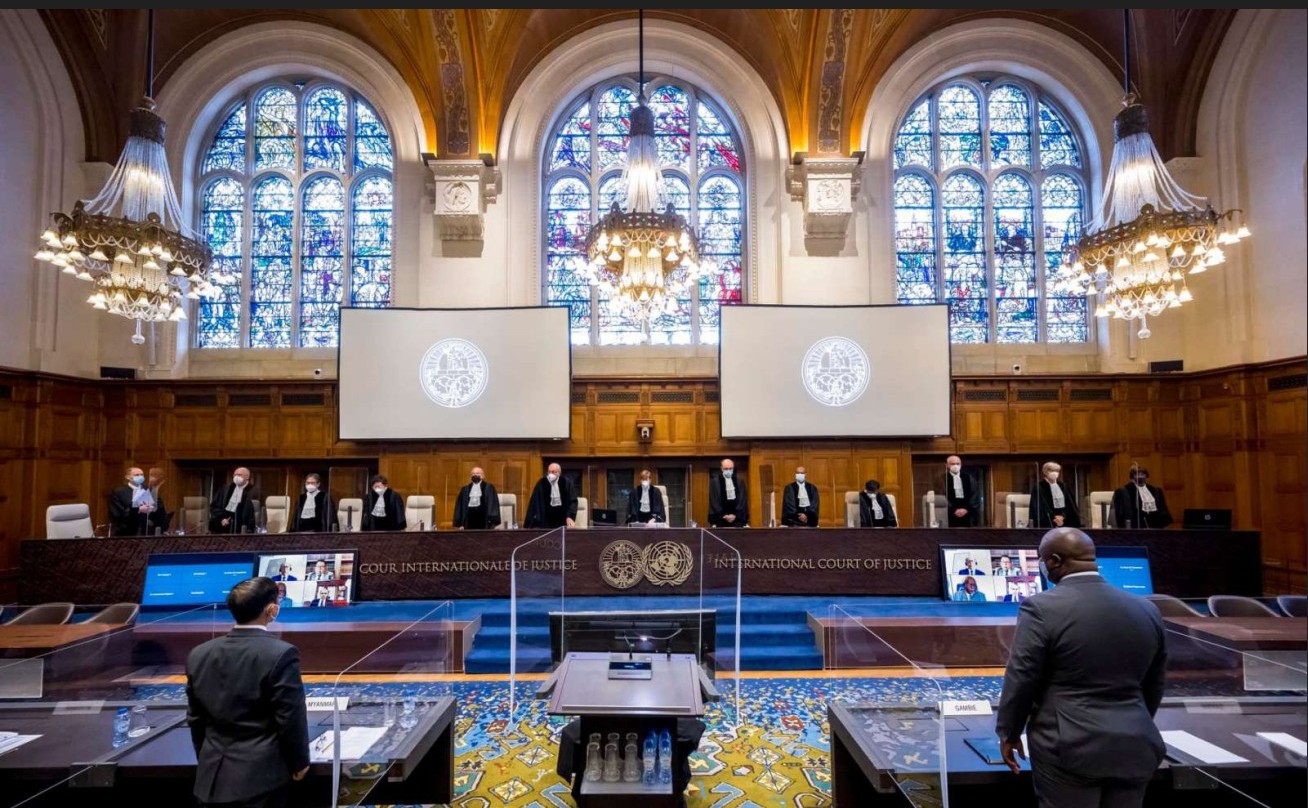
Under the National League for Democracy (NLD) government on August 25, 2017, the ARSA terrorist group launched simultaneous attacks on 30 Border Guard Police outposts in Rakhine State and killed non-Muslim civilians.
Subsequently, the Myanmar military (Tatmadaw) conducted "area clearance operations," after which approximately 700,000 Bengalis fled to Bangladesh. The Gambia filed the lawsuit at the ICJ, alleging that this displacement constituted genocide.
Myanmar is currently defending itself against these charges at the ICJ. The team led by Minister U Ko Ko Hlaing previously represented Myanmar at the ICJ in February 2022 as well.

- By CNI
- Category: English Section
- Hits: 127
CNI News
16 January 2026
The "Youth Peace Forum," being held in Nay Pyi Taw, Myanmar, continues for its third day on January 15, 2026.
The forum is being conducted from January 13 to January 15, 2026.
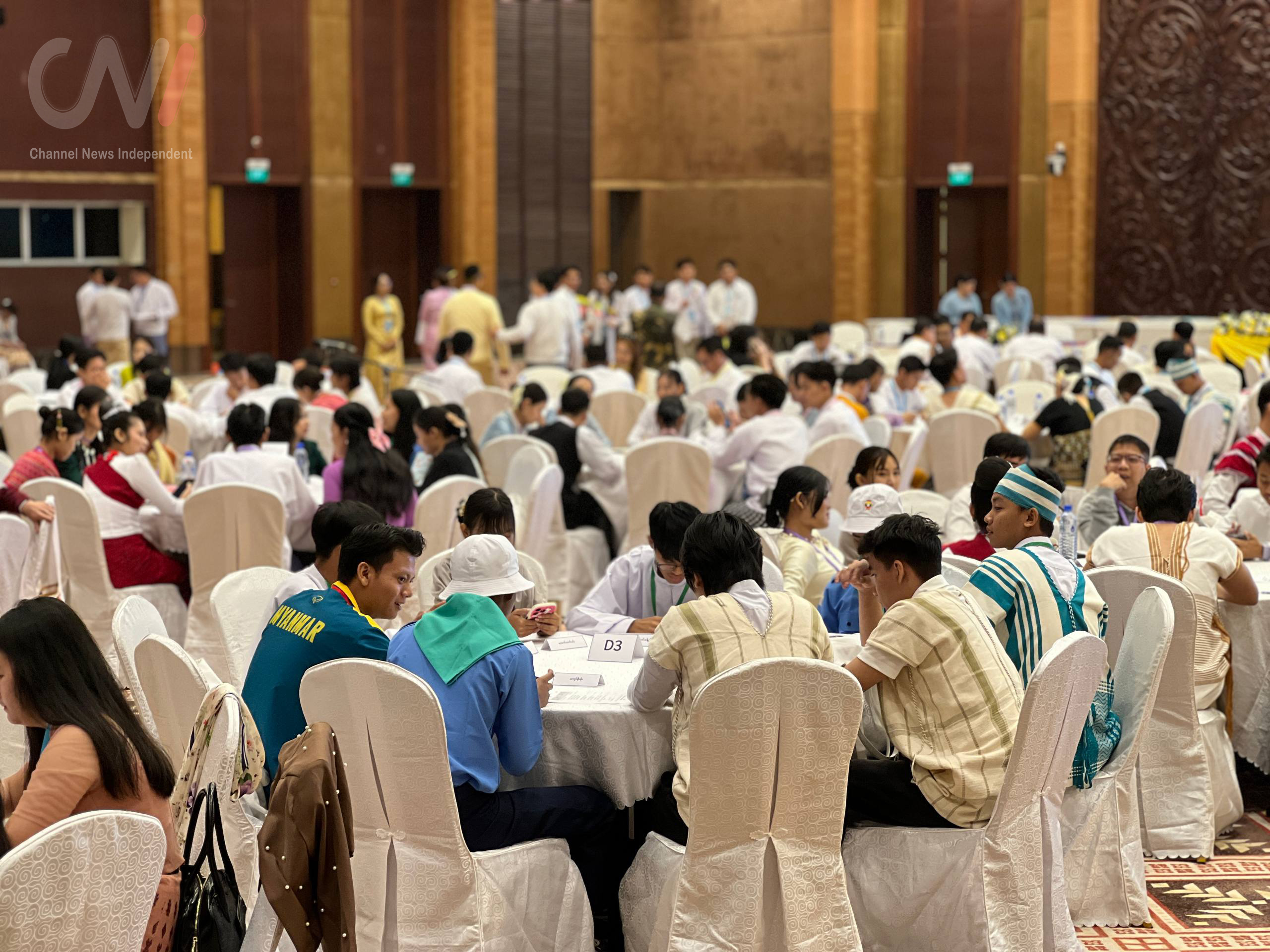
Youth from various Regions and States are attending and participating in the discussions at the forum.

- By CNI
- Category: English Section
- Hits: 164
CNI News
16 January 2026
In Myanmar, Part 1 of the election was held on December 28, 2025, and Part 2 was completed on January 11, 2026. The remaining Part 3 of the election is scheduled to proceed on January 25.
Daw Nan Khin Aye Oo, Chairperson of the Karen Peoples Party (KPP), told CNI News that while the KPP competed only in the Ayeyarwady Region during Parts 1 and 2—and cannot yet confirm their specific vote counts—the National Unity Party (NUP) has shown significant strength in Part 2 of the election.
She stated: "The areas where Part 2 was held—Pantanaw, Wakema, Kangyidaunt, and Kyaunggon—are regions with high Karen populations. The exact percentages haven't been finalized yet. In Kangyidaunt, the NUP ranked second. They also ranked second in Kyaunggon, and reportedly third in Wakema. In Einme, the NUP has won in many locations for the Ethnic Affairs Representative seats.
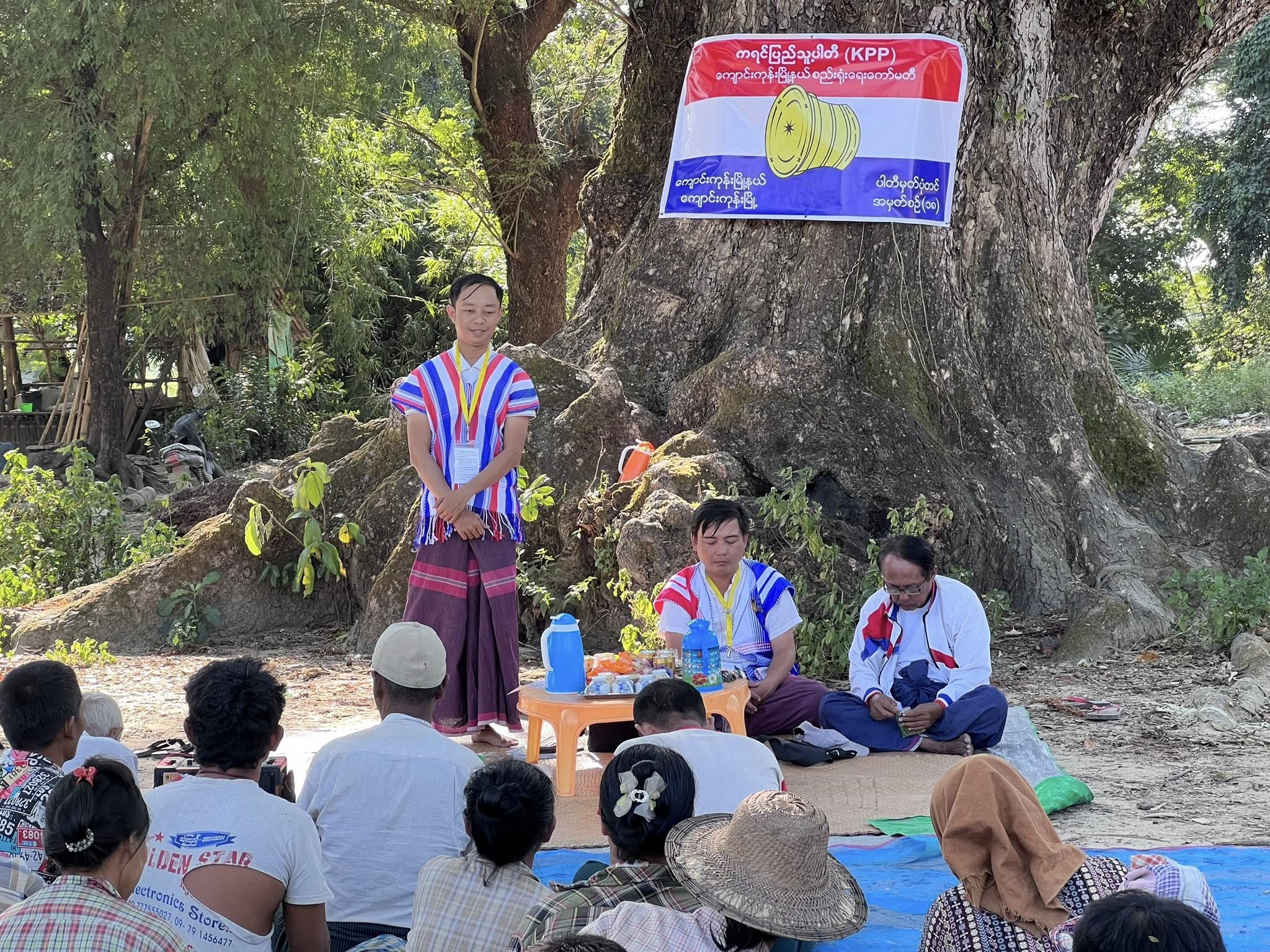
The Karen Peoples Party (KPP).
In Part 2, the NUP candidate for Ethnic Affairs won by a landslide. Yesterday, the NUP received an unexpectedly high number of votes. Pantannaw is traditionally NUP territory. We thought we would mainly be competing against the USDP (Union Solidarity and Development Party), but now we are competing against the NUP as well. The NUP is strong in urban areas. Both the USDP and our party lost in two polling stations, though we heard we won in two others."
U Sai Naing Naing Kyaw, Chairman of the Shanni Solidarity Party (SSP), told CNI News that the NUP is gaining strength because it is an established, long-standing party with a pre-existing base of hardcore members.
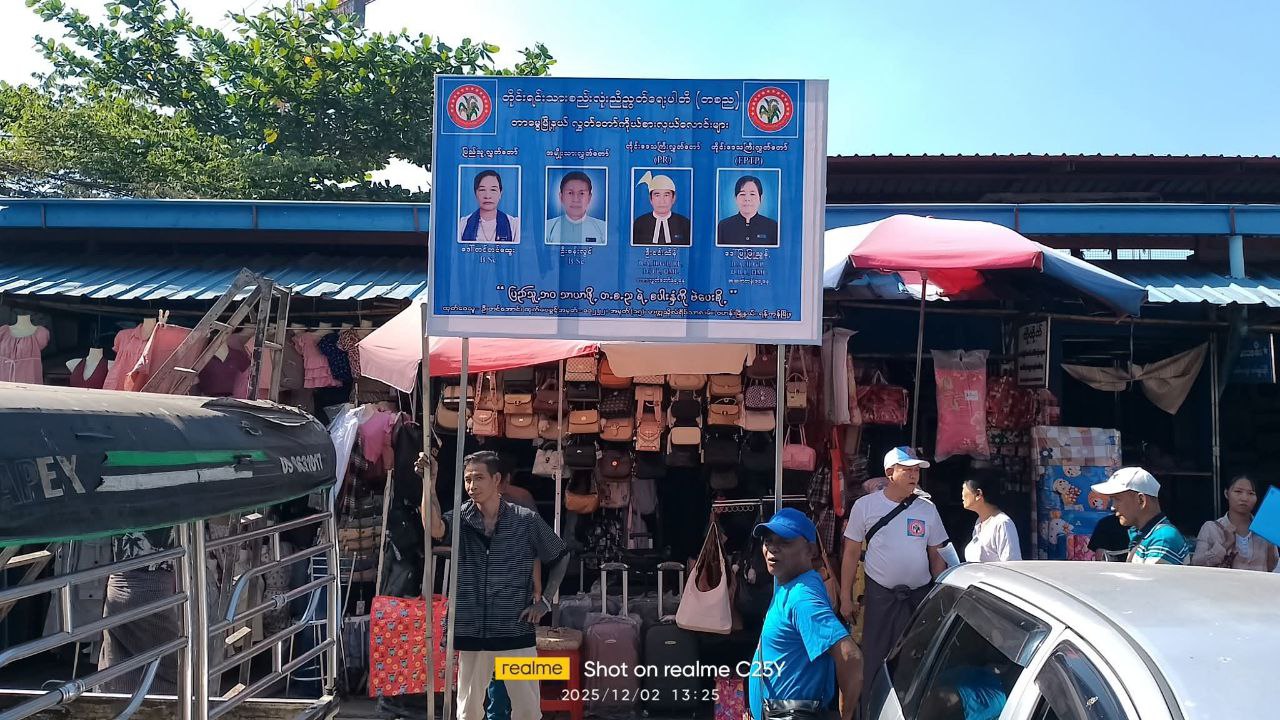
Candidates from the NUP.
He commented: "The National Unity Party is an old, established party. They already have their own loyal party members. Therefore, under the current changes to the electoral system, I believe the NUP is becoming even stronger."
According to available data, the Union Solidarity and Development Party (USDP) has secured over 80% of the vote nationwide across Part 1 (held December 28, 2025) and Part 2 (held January 11, 2026).
Following the USDP, the National Unity Party (NUP) ranked second in Part 1. The Pa-O National Organization (PNO), Naga National Party, Mon Unity Party, Arakan Front Party, and the Shanni Solidarity Party ranked third in terms of victories.

- By CNI
- Category: English Section
- Hits: 164
CNI News
15 January 2026
Following the conclusion of Phase 2 of the elections held on January 11, 2026, the Shanni people are closely monitoring the voting results of the Shanni (Tai Leng) Solidarity Party (SSP), commonly known as the "Tiger King" (Kyar Min) party.
Currently, Myanmar is conducting elections in phases: Phase 1 was completed on December 28, 2025, and Phase 2 on January 11, 2026. The remaining Phase 3 is scheduled to take place on January 25.
U Sai Naing Naing Kyaw, Chairman of the Shanni (Tai Leng) Solidarity Party (SSP), told CNI News that in Phase 2, the party contested under the First-Past-The-Post (FPTP) system only in Phaungbyin Township. According to ground data, the party lost in all seats within that township.
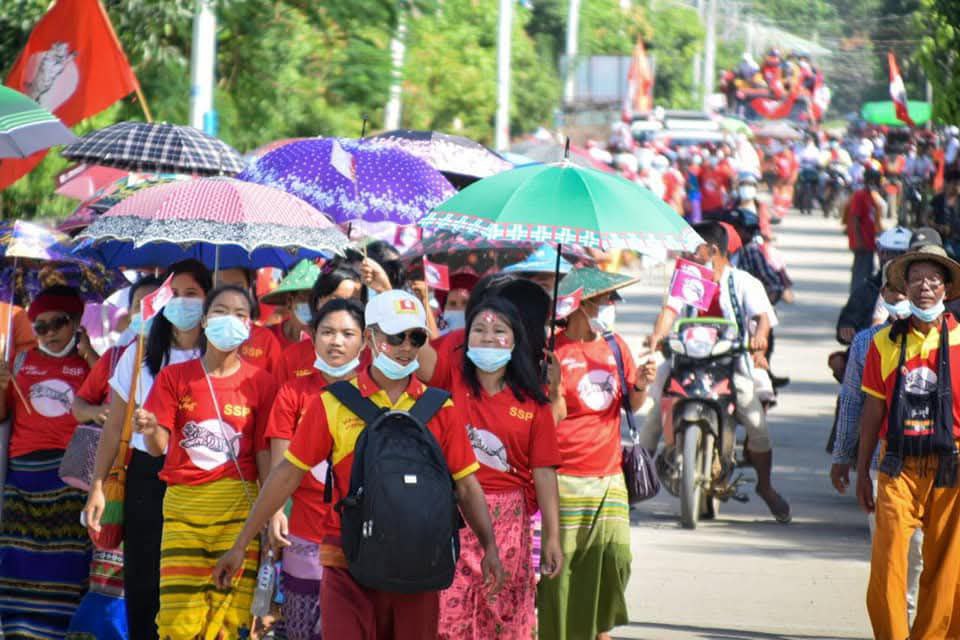
Supporters of the Shanni (Tai Leng) Solidarity Party (SSP).
He stated: "In Phase 2, our Shanni party only competed in Phaungbyin Township. We lost the election there for the Amyotha Hluttaw (Upper House) under the FPTP system. It appears the Union Solidarity and Development Party (USDP) won everything in Phaungbyin. Our Shanni party is in approximately third place, with the National Unity Party (NUP/Ta Sa Nya) running in second. Based on the statistics, voter turnout in Phaungbyin seems to be over 70%. Our analysis shows that in Phaungbyin, our party received only about one-third of the votes the NUP received, and only about one-tenth of the votes the USDP received."
In Phase 1 of the election held on December 28, 2025, many parties lost to the USDP due to advance votes. Similarly, following Phase 1, some political parties have criticized a lack of transparency regarding the advance voting process.
However, U Sai Naing Naing Kyaw told CNI News that he did not see major issues regarding advance votes in the townships where they competed, such as Homalin and Phaungbyin.
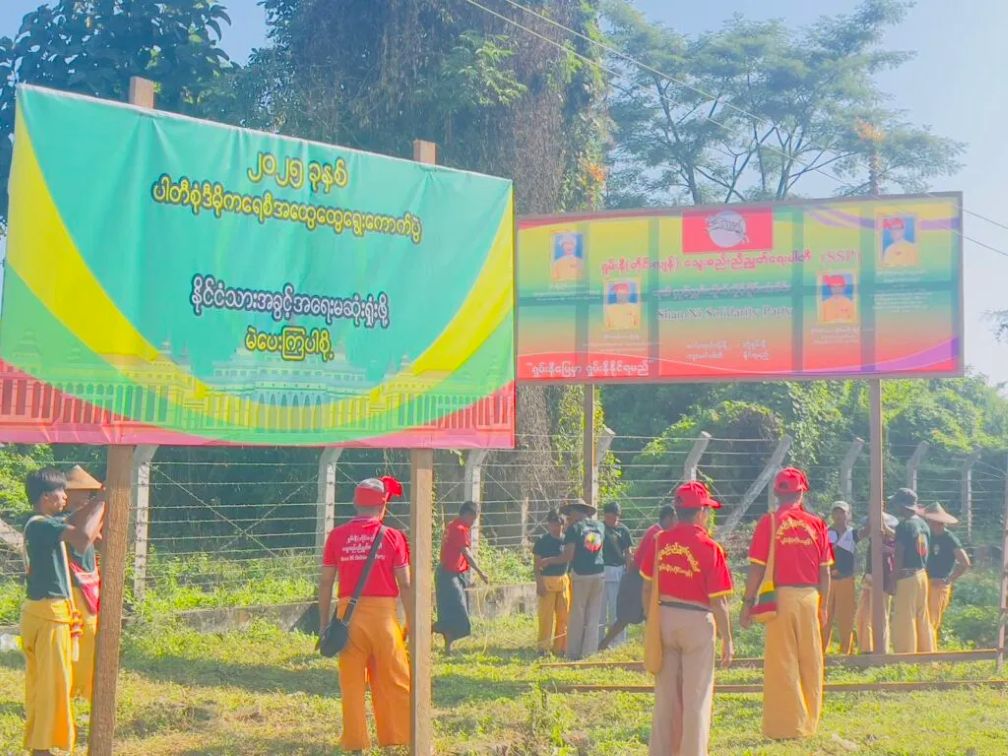
The Shanni (Tai Leng) Solidarity Party (SSP).
He added: "Regarding advance votes, I’ve only seen reports of issues online. In the Homalin area, there were no major problems with advance voting. Since I live in Homalin myself, it’s hard to speak exactly for the situation in Phaungbyin, but it seems there weren't massive issues there either."
The Shanni Party (SSP), known locally as the "Tiger King" party, secured wins in Phase 1 for seats in the Pyithu Hluttaw (Lower House), Amyotha Hluttaw (Upper House), and Regional Hluttaw within Homalin Township.
Specifically, for the SSP in Homalin Township, Sai Naing Naing Kyaw won the Pyithu Hluttaw seat, and Sai San Hla Soe won a Regional Hluttaw seat.

- By CNI
- Category: English Section
- Hits: 148
CNI News
15 January 2026
The second day of the Youth Peace Forum being held in Nay Pyi Taw, Myanmar, was observed on January 14, 2026.
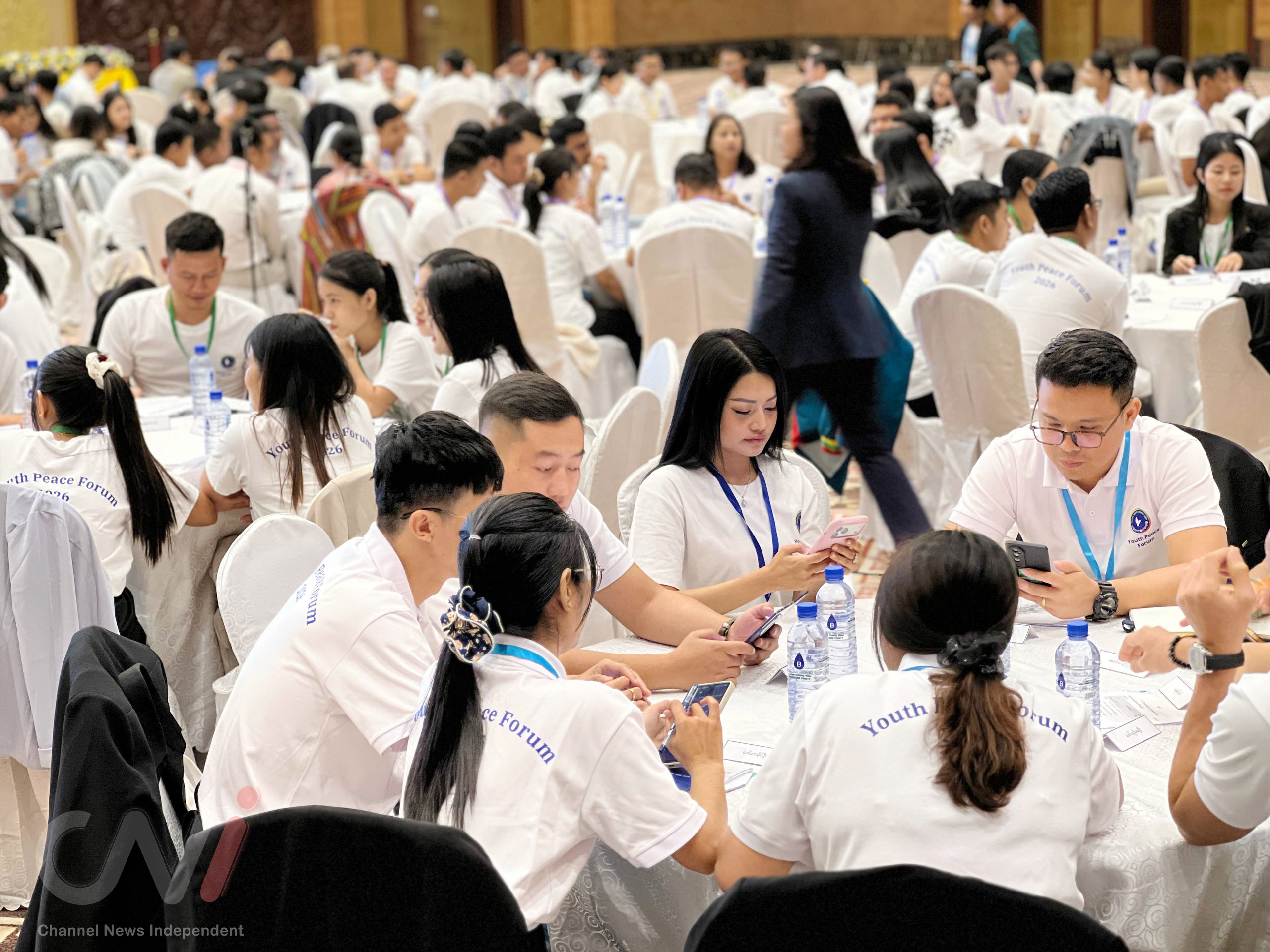
The forum is scheduled to take place from January 13 to 15, 2026. It is organized and led by the National Solidarity and Peacemaking Negotiation Committee (NSPNC), with youth representatives from various regions and states in attendance.

- By CNI
- Category: English Section
- Hits: 198
CNI News
15 January 2026
The Union Election Commission (UEC) has announced that legal action will be taken against Daw Thet Thet Khine, Chairperson of the People's Pioneer Party (PPP), and Central Executive Committee member Daw Htet Htet Hlaing.
The move follows reports of a clandestine meeting between the two party leaders and officials from a foreign embassy.
While the UEC has confirmed that action "in accordance with the law" will be taken, the specific charges and the exact nature of the penalties have not yet been disclosed.
On December 18, 2025, Daw Thet Thet Khine and Daw Htet Htet Hlaing reportedly held an unauthorized and secret meeting with individuals from a foreign embassy at a restaurant on Nat Mauk Road, Bahan Township, Yangon.
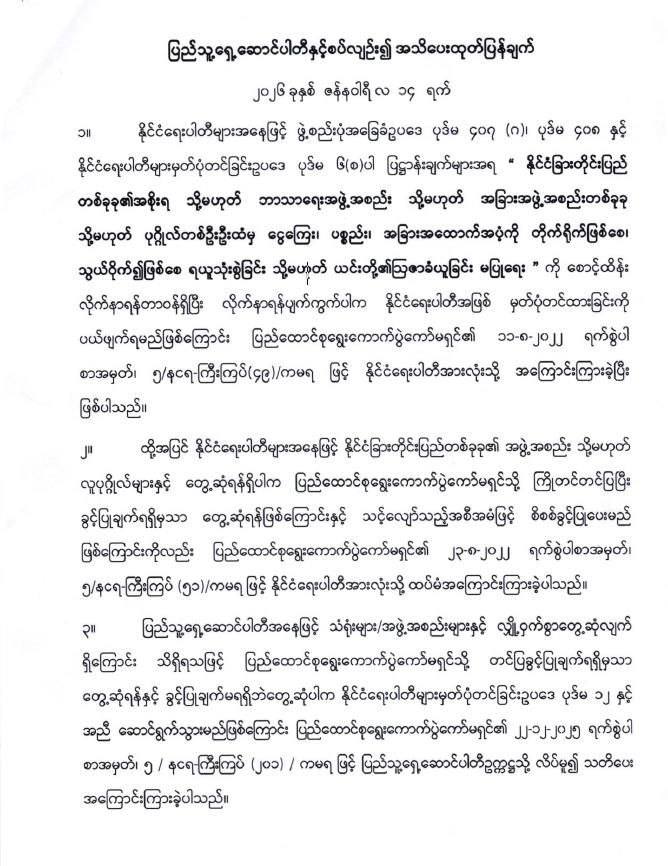
Following a tip-off, the UEC conducted an investigation and determined the report to be true. According to the UEC statement, both Daw Thet Thet Khine and Daw Htet Htet Hlaing have confessed to the meeting.
The UEC highlighted that under Section 407(c) and 408 of the Constitution, as well as Section 6(f) of the Political Parties Registration Law, political parties are strictly prohibited from:
Accepting direct or indirect financial, material, or other support from foreign governments, religious organizations, or other foreign entities/individuals.
Being under the influence of foreign entities.
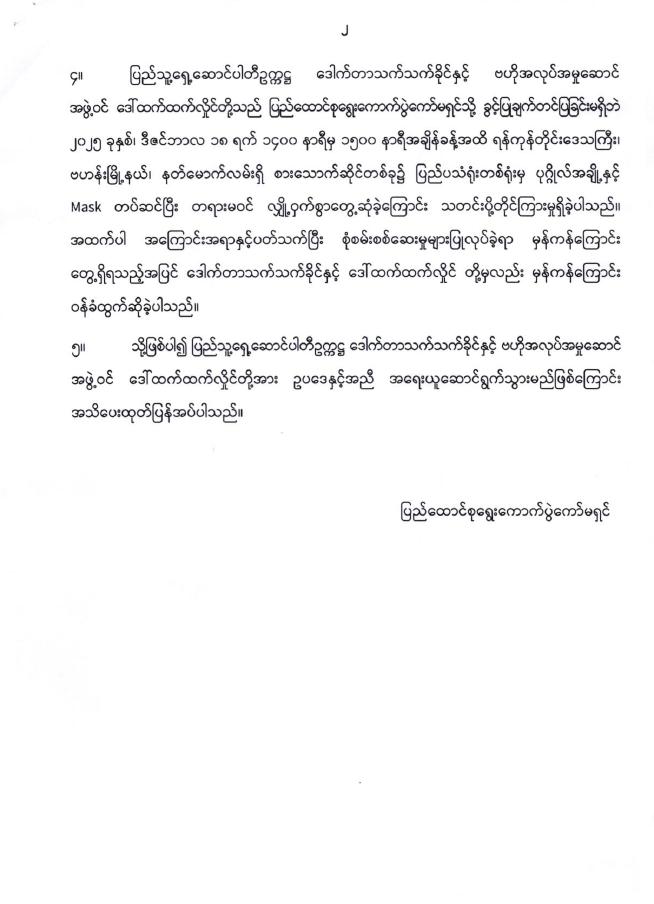
Consequences: Failure to comply with these regulations can lead to the cancellation of a party's registration.
This legal trouble comes at a sensitive time for Daw Thet Thet Khine. In October 2025, she was already disqualified by the UEC from running as a parliamentary candidate due to "unresolved financial liabilities" (specifically a large bank loan).
Furthermore, recent reports indicate that following this embassy meeting incident, Daw Thet Thet Khine was detained for questioning at her residence in Sanchaung Township on the evening of January 13, 2026.

- By CNI
- Category: English Section
- Hits: 151
CNI News
14 January 2026
Myanmar Narrative stated on January 12, 2026, that it fully supports the Myanmar delegation that will travel to plead Myanmar’s case at the International Court of Justice (ICJ) in The Hague, Netherlands.
The hearings at the ICJ in The Hague concerning the so-called “Bengali issue” will be led by a Myanmar delegation headed by U Ko Ko Hlaing, Union Minister of the Ministry (2) of the President’s Office.
It is reported that Union Attorney General Dr. Thida Oo, Union Minister of the Ministry of Legal Affairs, is also accompanying U Ko Ko Hlaing, and that the Myanmar delegation departed for the Netherlands on January 9, 2026.
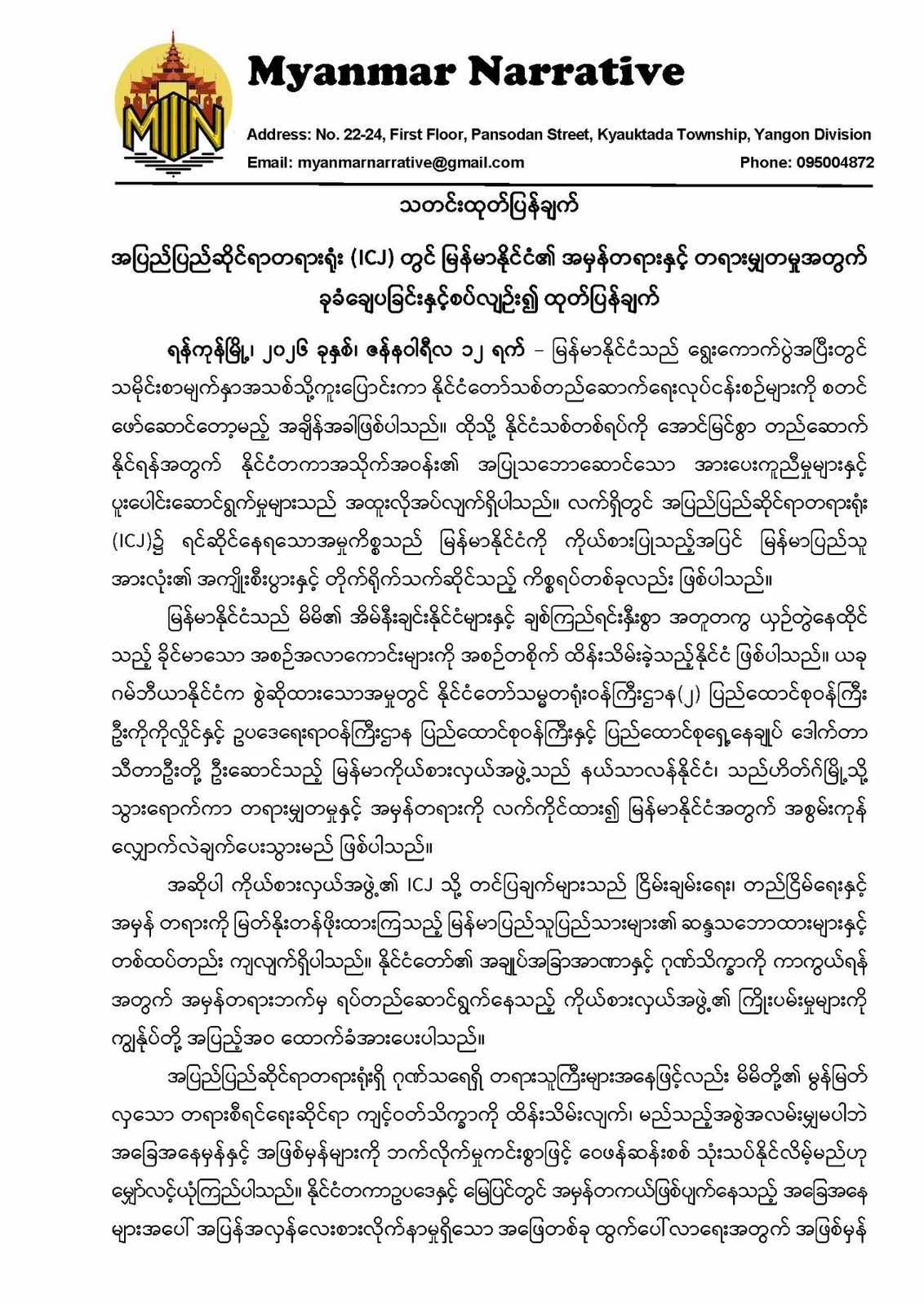
The statement issued by Myanmar Narrative being seen
The ICJ hearings will be held from January 12 to January 29. Myanmar is scheduled to present its pleadings twice: once from January 16 to January 20, and again from January 28 to January 29.
Myanmar Narrative said: “The submissions presented by the Myanmar delegation to the ICJ are fully in line with the wishes of the people of Myanmar who value peace, stability, and truth. We fully support and encourage the efforts of the delegation, which is standing on the side of truth in order to protect the sovereignty and dignity of the State.”
The group further stated that Myanmar is a country with a strong tradition of peacefully coexisting in friendship with its neighboring countries, and that it has consistently upheld these good traditions.
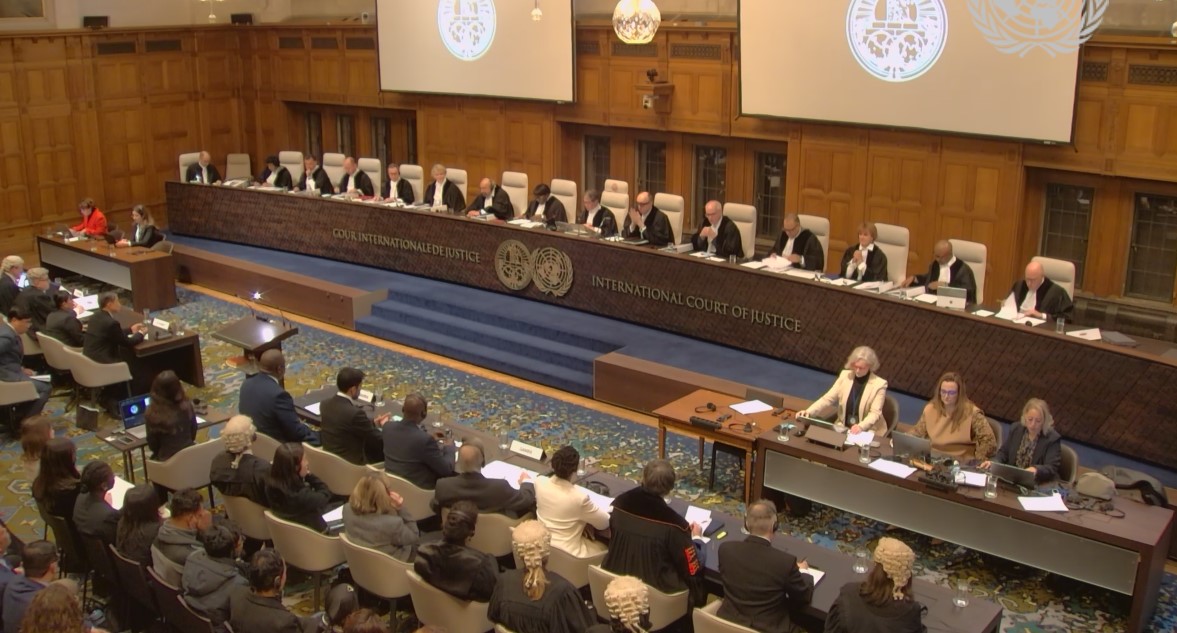
During an ICJ hearing
Myanmar Narrative also expressed hope and confidence that the honorable judges of the International Court of Justice will uphold their noble judicial ethics and be able to impartially assess and analyze the true circumstances and facts. It emphasized that, in order for an outcome to emerge that is based on mutual respect for international law and the realities actually occurring on the ground, it is extremely important to fairly and justly examine and decide upon the facts.
The ICJ case originated from allegations of genocide following coordinated attacks by the ARSA terrorist group on 30 border guard police posts in Rakhine State on August 25, 2017, during the tenure of the National League for Democracy (NLD) government.
As a result of these allegations, The Gambia filed a case against Myanmar at the ICJ on charges of genocide, requiring Myanmar to respond and defend itself before the court.
The delegation led by Minister U Ko Ko Hlaing had previously also represented Myanmar at the ICJ in February 2022.

- By CNI
- Category: English Section
- Hits: 179
CNI News
14 January 2026
Colonel Khun Okkar, Chairman of the Pa-O National Liberation Organization (PNLO-NCA/S), a signatory of the Nationwide Ceasefire Agreement, told CNI News that Myanmar can defend itself at the International Court of Justice (ICJ) by arguing that its actions were a response to ARSA terrorism and did not constitute genocide.
A Myanmar delegation led by Minister for the Ministry (2) of the President's Office, U Ko Ko Hlaing, will present the defense at the ICJ hearings in The Hague, Netherlands, regarding the Rohingya (Bengali) issue.
The delegation, which includes Union Attorney General and Minister for the Ministry of Legal Affairs Dr. Thida Oo, departed for the Netherlands on January 9, 2026.
The ICJ hearings are scheduled from January 12 to January 29. Myanmar is slated to present its oral arguments twice: first from January 16 to 20, and again from January 28 to 29.
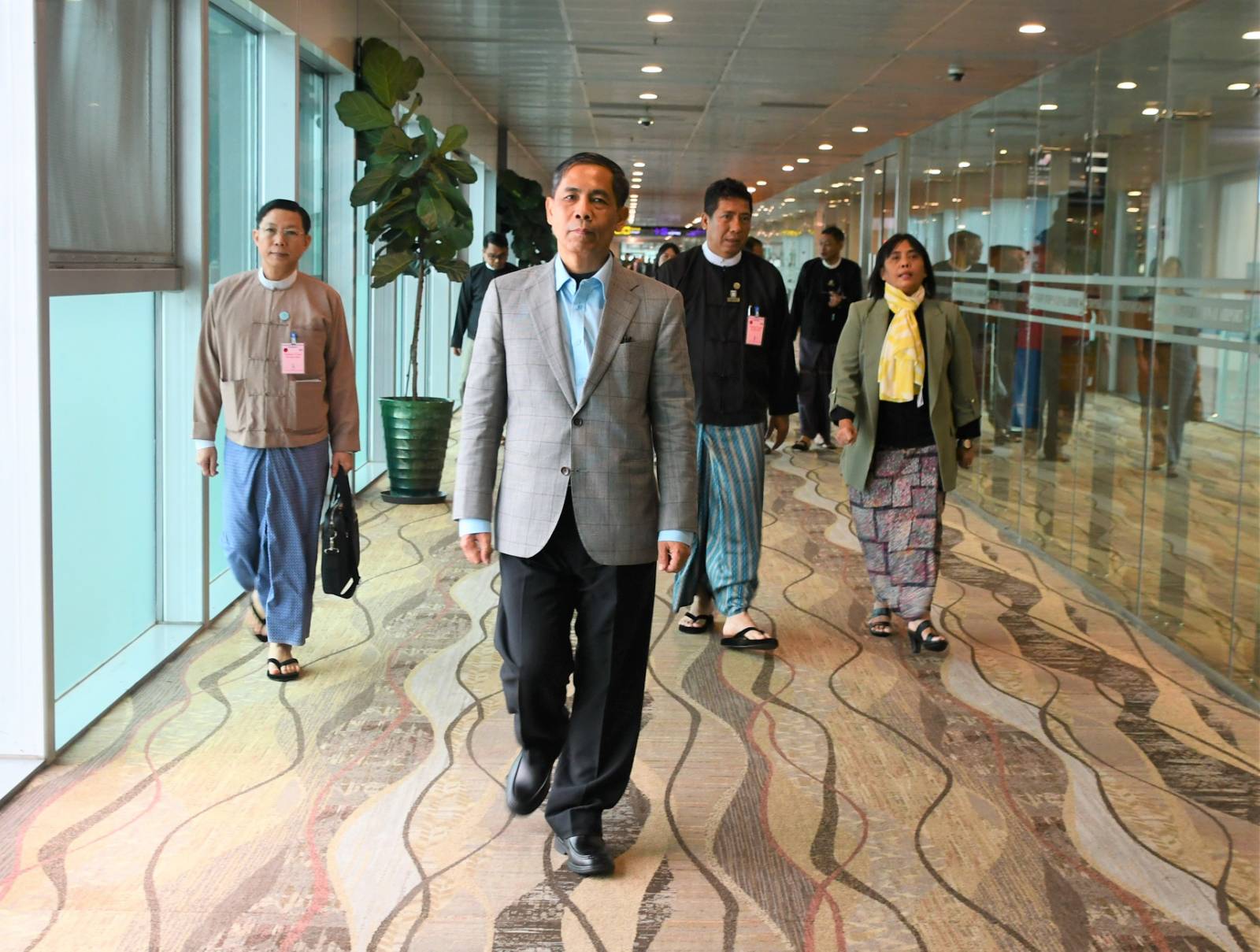
U Ko Ko Hlaing and Dr. Thida Oo seen at the airport.
Colonel Khun Okkar suggested that the Myanmar representatives could approach their defense from two primary legal angles, emphasizing the lack of genocidal intent.
"From what I understand, there are two ways to argue from a legal perspective," he said. "First, by highlighting these terrorist organizations. When groups like ARSA attacked police stations at that time, human rights violations might have occurred during the crackdown on such terrorist groups. However, they can defend themselves by stating there was no 'Genocide Intention.'"
Colonel Khun Okkar further explained that the Myanmar representatives might challenge whether the Gambia can provide sufficient and solid evidence for its allegations.

U Ko Ko Hlaing presenting oral arguments at the ICJ.
"Secondly, the accuser must provide sufficient evidence. Can they provide enough solid proof? You cannot prosecute a case without adequate evidence. Therefore, the next question is whether the Gambia can prove a 'Material Breach.' The second point is that there was no genocidal intent; it happened during counter-terrorism operations. While there may be suspicions of genocide because of that, it does not mean genocide actually occurred. In law, if there is a 'benefit of the doubt' regarding whether genocide happened, that benefit goes to the defendant. If our country receives that benefit of the doubt, it would mean the actions do not amount to genocide. I believe they will approach the case with these two questions: whether the accusing side can present full evidence."
The ICJ case stems from allegations of genocide following coordinated attacks by the ARSA terrorist group on 30 border guard outposts in Rakhine State on August 25, 2017, during the National League for Democracy (NLD) government's tenure.
The Gambia filed the lawsuit against Myanmar at the ICJ based on these allegations, leading to Myanmar's ongoing legal defense.
The team led by Minister U Ko Ko Hlaing previously represented Myanmar at the ICJ in February 2022.



